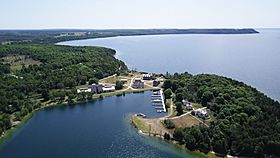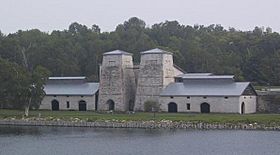Fayette Historic State Park facts for kids
Quick facts for kids Fayette Historic State Park |
|
|---|---|

The historic townsite seen from above Snail Shell Harbor
|
|
| Lua error in Module:Location_map at line 420: attempt to index field 'wikibase' (a nil value). | |
| Location | Fairbanks Township, Delta County, Michigan, United States |
| Area | 850 acres (340 ha) |
| Elevation | 650 feet (200 m) |
| Established | 1959 |
| Administered by | Michigan Department of Natural Resources |
| Designation | Michigan state park |
|
Fayette Historic State Park
|
|

The blast furnace complex
|
|
| Built | 1867 |
| NRHP reference No. | 70000269 |
| Significant dates | |
| Added to NRHP | February 16, 1970 |
Fayette Historic State Park is a special place in Michigan, USA. It's a park that protects an old town called Fayette. This park is on the Big Bay de Noc of Lake Michigan, which is on the southern part of Michigan's Upper Peninsula.
Long ago, from 1867 to 1891, Fayette was a busy industrial town. People here made something called charcoal pig iron. Today, the town has been rebuilt to look like it did back then. It's like a living museum where you can see what life was like in the late 1800s. Because of its history, Fayette Historic State Park was added to the National Register of Historic Places in 1970.
Contents
The Story of Fayette: An Iron Town
Fayette was once one of the busiest places in the Upper Peninsula for making iron. The town grew around two large furnaces, a big dock, and many charcoal kilns. This happened after the Civil War when there was a great need for iron.
Building an Iron Community
Almost 500 people lived in Fayette, many of them immigrants from Canada, the British Isles, and northern Europe. They all worked to make pig iron. For 24 years, Fayette's furnaces produced a huge amount of iron, over 229,000 tons! They used wood from local forests for fuel and limestone from nearby cliffs to clean the iron ore.
Why the Iron Town Closed
The market for charcoal iron started to slow down. Also, the forests around Fayette were running out of the special hardwood needed for fuel. This meant the Jackson Iron Company closed its Fayette operations in 1891.
After the ironworks shut down, most people left Fayette to find new jobs. Only about 20 residents stayed, making a living by farming and fishing.
Fayette Becomes a State Park
After the iron operations closed, Fayette changed. It became a resort and a fishing village. In 1916, a wealthy person bought the town and turned it into a summer getaway. It stayed a resort until 1946 when it was sold again. Eventually, the Escanaba Paper Company owned it. They traded the land with the Michigan government for timberland. This is how Fayette became a state park in 1959, so everyone could enjoy its history and beauty.
Visiting the Historic Townsite
The Fayette Historic Townsite is like stepping back in time. It's a museum that is open during certain seasons. You can go inside the restored buildings to learn about life in the late 1800s. There's also a visitors center and a museum shop.
Fun Things to Do at the Park
Fayette Historic State Park offers many activities for visitors.
- Camping: There are 61 campsites and one lodge you can rent.
- Water Fun: Enjoy a swimming beach, a boat launch, and a fishing pier.
- Picnics and Play: There's a picnic area and a playground for kids.
- Hiking Trails: The park has about 5 miles (8 km) of trails. These trails go through beautiful forests and around the historic townsite.
- Scenic Views: One trail climbs up dolomite cliffs, which are part of the Niagara Escarpment. From here, you can see amazing views!
See also
- Spider Cave: An interesting archaeological site located within the park.

